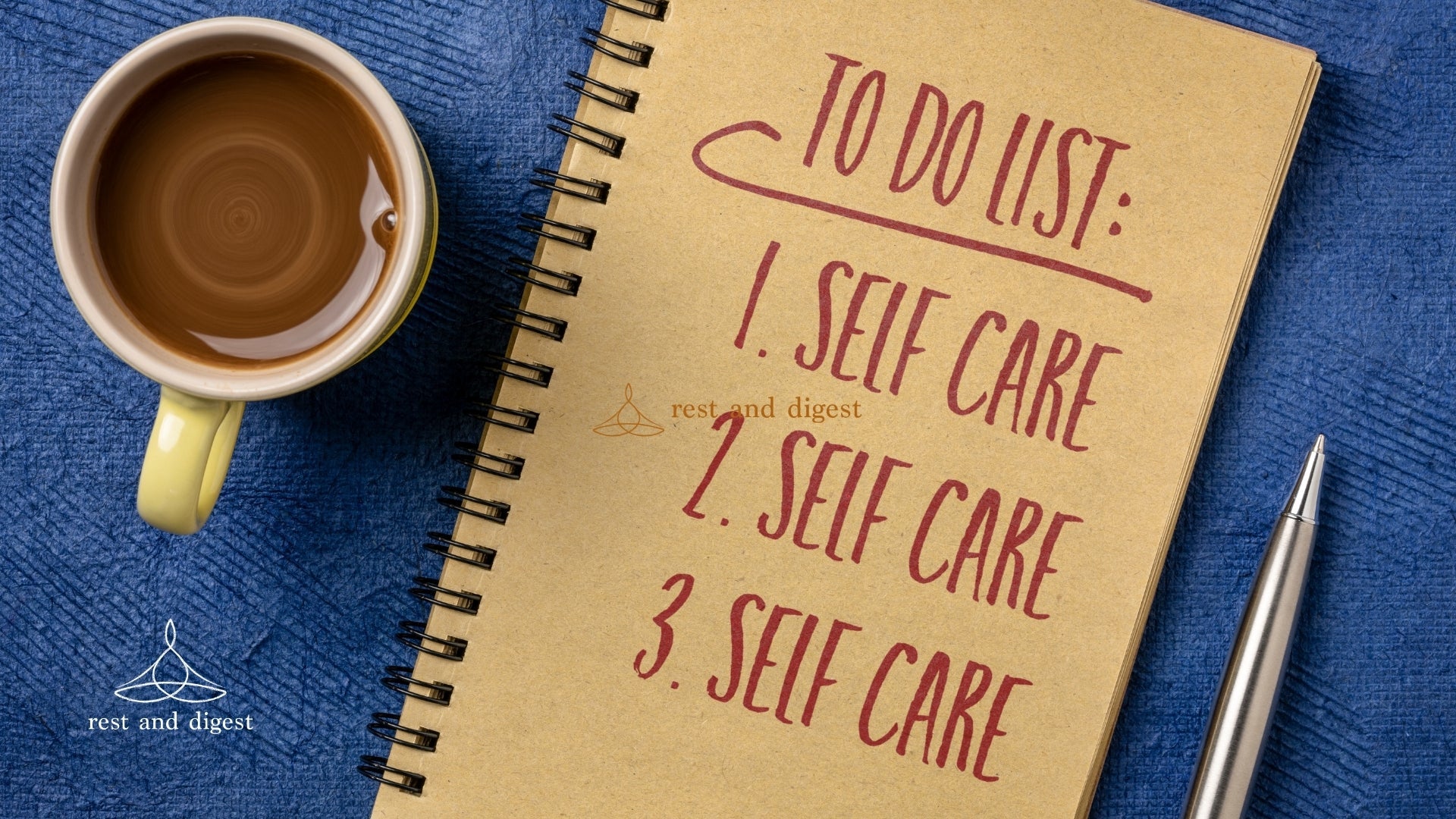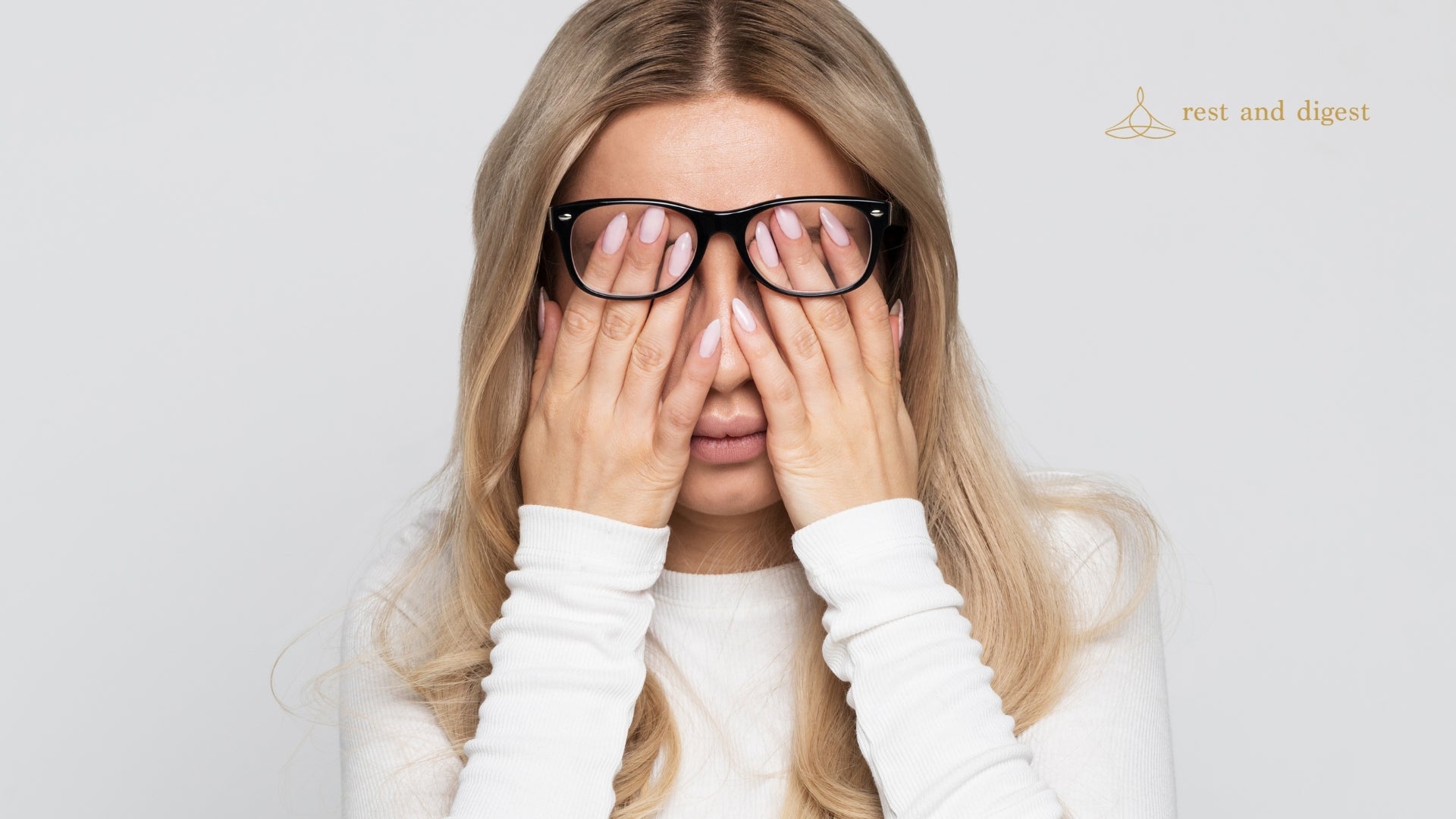
Self Care Ideas
Essential Routines to Nurture Your Mind, Body and Soul
Because of the hustle and bustle involved in modern life, it’s incredibly easy for us to get caught up in the storm of everyday activities without taking care of our well-being. Even though self care might seem like a buzzword, it has its significance that can never be underestimated. Self care is not selfishness but it is an essential routine that supports our brain, body, and soul and allows us to perform better in all aspects of our lives.
This guide will discuss why self care activities are important, how to establish a self care routine, and present numerous self care ideas on what you can do for yourself. We will also provide you with loads of great ideas for self care that you may not have thought of before. Most of the products we offer on Rest and Digest are perfect gift ideas for loved ones in your life and we have some perfect self care gifts for her for all occasions.
The Meaning of Self Care
Self care doesn’t mean treating ourselves with bubble baths or having a sweet tooth (although those things are part of it). Primarily, this implies setting aside some time for our physical health, emotional well-being, and mentality as well.
In today’s world where people work very hard, they often experience stress and burn out resulting in many different health conditions including anxiety and depression besides other issues such as high blood pressure or a weakened immune system.
Self care practices can be included in our daily lives to lessen the negative effects of stress and build resilience. Our well-being should come first as it prepares us for life’s demands, fosters good relationships, and helps us to be clear on the goals we want to achieve.
Here is a quick list of 20 go to activities for you to choose from right now:
- plan a holiday

- start a course relating to your favorite hobby
- take a bath
- buy yourself some flowers
- take a photo of your pet
- take 5 deep breaths and exhale slowly
- light a scented candle
- open up all the blinds and windows in your home on a sunny day
- cook your favorite meal
- read inspirational quotes
- have an afternoon siesta
- watch the sunrise and sunset on the same day
- turn your phone off for 2 hours
- drive to the top of the nearest mountain
- drink only water for a day
- go for a walk in the botanical gardens
- lie outside at night and look at the stars
- watch the clouds float past for 10 minutes
- make yourself a fruit smoothie
- set you alarm for 6 am and go for a walk
15 Activities To Try
There are countless self care possibilities that you can choose from depending on what your creativity and preferences dictate. Here are a few self care ideas to get you started on your journey. Remember, there is no one best method of self care. You may try different things until you find out which works best for you.
1. Meditation and Mindfulness
Meditation and mindfulness practices top our list of self care ideas; they help relieve stress significantly while increasing mental clarity considerably too. Within your home, design a quiet space specifically meant for meditation and mindfulness. Decorate the area with soft pillows, flickering candles, and soothing scents of essential oils. Set aside for at least 10 minutes each day sitting silently just focusing on your breath while letting thoughts drift away like clouds do in the sky. To deepen your practice and bring more peace into your heart, try some guided meditations, mindfulness apps, or gentle yoga flows.
2. Sports and Yoga
Physical movement is beneficial to your body as well as your mental health. Examples include yoga, running, dancing, or any sort of physical exercise that you like. Be free to experiment with new self care activities and places that will bring fun to your workouts. You can try doing yoga on a paddle board, dance under the moonlight, or hike to a very beautiful point of sight. Make sure you make your exercises playful enough by introducing jumping ropes, hula hoops, or outdoor courses in them. Do not be afraid of letting go of yourself through natural and thrilling movements.
3. Balanced Diet

Ensuring that one’s meals are healthy helps the body to work at its best, thus contributing to general health and well-being. Create an artful kitchen where nutrient-dense ingredients become masterpieces on the palate. Fill your plate with vibrant produce, whole grains, and exotic spices for taste-bud-tingling dishes with an intense nutritional punch. Take up the challenge of making culturally diverse multi-course dinners every week; this will allow you to try out different cuisines and cooking methods across different regions of the world. Let go of everything else around you as you eat mindfully savoring every bite while rejoicing at nature’s bounty.
4. Quality Sleep
Proper rest is essential for cognitive performance, balancing moods, and well-being in general. Create a bedtime ritual that will bring you into an ecstatic state of calmness and serenity. Start by dimming the lights and getting into your most comfortable pajamas. Engage yourself with an exquisite skincare regimen using hydrating serums as well as soothing creams to pamper your skin. Other self care ideas at night may include taking a warm cup of herbal tea which is infused with calming herbs such as chamomile or valerian root. Delve into an engrossing book or listen to a peaceful podcast before being lulled to sleep where thoughts can easily wander to dreamscapes.
5. Time in Nature
Get closer to the natural world by experiencing it directly on adventurous escapades that awaken your senses and calm your soul down. Meander through magical woods dressed in dappled light; climb up towards high summits breathing fresh mountain air; or put your feet into the cool water of a quiet lake. Explore other self care ideas like watching birds, drawing wildflowers, or bathing in forests so that the sights, sounds, and smells out there will help refresh you spiritually while simultaneously inspiring your creativity.
6. Journaling
Journaling is a transformative practice that you can use to dive deep into the labyrinth of your inner world, which is among the emerging self care ideas today. Make sure that every day has some sacred time for it when you can pour on the pages of your diary all your thoughts, feelings, and dreams allowing ink to flow freely and unrestrainedly. You may also try other journaling styles like stream-of-consciousness writing, gratitude journaling, or creative storytelling.
7. Self-Reflection

Every day, create some special time to be alone and reflect on yourself. Withdraw yourself to a quiet place of solitude where you can meet the innermost you without any interference from the outside world. Take up contemplative exercises like breathing exercises, meditation, or mindful strolling to explore the inner landscapes of your heart and mind. Ask yourself perplexing questions that strike at the core of your soul and heed what your inner voice tells you.
8. Creative Expression
Unleash your creative imagination that will empower you to fearlessly speak out in any form of art. In your home, find a place where you can unleash your inner artist and this should be full of colorful paints, canvases, musical instruments, and craft supplies. Some engaging self care ideas include intuitive painting, impromptu dance, and group storytelling among friends. Letting your intuition comprehend the creative current is how you can get in touch with the endless source of inspiration within.
9. Pampering
Make self care an indulgent pleasure and receive it as a gift of unconditional love for yourself. Turn your bathroom into a luxurious spa with flickering candles, bath oils that smell nice, and fluffy towels. Take in a banquet of sensations as you lie down in bubbling bath water mixed with essential oils in a hot tub followed by scrubbing your body clean and then applying a nutritional face mask afterward among others. Consider other forms of self care ideas such as aromatherapy, soft tunes, and misting sprays for dry skin while enjoying high-end body lotions and tempting treats too. Allow your muscles to sink into pure bliss and succumb to the soothing arms of self-love through these sensory pampering feelings.
10. Digital Detox
Regain control over your time and attention by escaping the digital inundation through a rejuvenating digital detoxification process. There must be specific periods in every single day or week to dedicate yourself free from screen dominations but rather engage in offline activities only. For instance, reading a paper book or writing letters by hand. Engage deeply in face-to-face conversations with friends and family while appreciating real-life interactions away from screens. Other suggestions of self care ideas can include crafting, puzzle solving as well as board games.
11. Social Connection

Taking time to be with friends or people who make you feel good is very important to mental health and emotional balance. Meet up with close friends to laugh, cry with one another, and share experiences that we all come across as humans. From having intimate discussions about life’s most meaningful things over dinner to enjoying some soulful beats, these nights are always special for everyone present. Open your heart, embrace vulnerability, and let people see you for who you really are. You will always be surrounded by love and acceptance that never fails. Making time for in-person meetings, phone conversations or video chats would be your priority when it comes to fostering your connections and interacting with people that make you happy and optimistic. Socialising with people that fill your bucket is one of the most nourishing form of self care - and it's free and you can do it whenever you feel like it.
12. Learning and Growth
Continuous learning is one of the best types of self care ideas ever. Immerse yourself in books that motivate, challenge, or arouse your curiosity. Enrol for classes, workshops, or seminars that correspond with your inclinations and hobbies. Develop new talents and self care practices that will push the boundaries of your comfort zone while stimulating your imagination. Through constantly seeking knowledge as well as pushing yourself beyond limits, you start on a process of personal evolution and fulfillment; this can bring out all that you are capable of becoming.
13. Decluttering
Clearing out living spaces by tidying up can lead to decluttered spaces that help reduce mental stress levels caused by cluttered areas. Reasonably cleaned-up space promotes peace and clarity within oneself making concentration and relaxation easy to attain. Donate away something no longer useful, recycle old papers, or convert forgotten treasures into new forms expressing beauty and usefulness. Extend your decluttering efforts into the emotional realm by letting go of limiting beliefs, toxic relationships, and outdated patterns of thinking that do not serve your goals.
14. Connecting with Pets
Spend quality time with your loved animals participating in games, comforting them while cuddling and conversing with them. Be uplifted by the unconditional love of your beloved pet as it calms down your mind, restores the spirit within you, and reminds you of life’s simple pleasures. Their boundless curiosity, and energy for joyfulness even through adversity should be a guiding force in your life’s experiences.
15. Solo Ventures

Embrace the excitement that comes with solo adventures as opportunities for self-discovery as well as empowerment. Go into unfamiliar territory like visiting a new place, trying out something new, or simply going on a retreat all by oneself. Look at solitude as an avenue of knowing yourself better by listening to what your inner thoughts might be saying so that you can act on them. Individual adventures create independence, and toughness and can give someone the feeling of being alive. Whether it is a solo movie date, a solo food trip, or a shopping spree, the list of self care ideas in your solo adventure is endless.
See our range of curated self care gifts and hamper packages here:
Deluxe Self Care Hamper
Ultimate Self Care Box
Body Self Care Package
Mindful Self Care Gift Box
See our range of self care ideas and products below:

Creating A Routine
Making a self care routine doesn’t need to be difficult. Here’s how you can go about making your own.
- Consider your needs: Think about the different parts of your life that need addressing, may it be physical, emotional, or social well-being.
- Be realistic with your goals: When you first begin planning out your schedule, start with something small and slowly incorporate more self care practices into your daily or weekly activities so as not to get overwhelmed.
- Set priorities: Find out which self care ideas resonate most with what makes you happy, relaxed, or fulfilled; thus creating an individualized self care routine driven by your likes and interests.
- Schedule regular time: Allocate specific slots in your diary for self care activities. Regard it as time for being kind to oneself that should be put aside at all costs.
- Stay flexible: The ability to adjust is crucial when planning one’s personal care routine since life is unpredictable hence necessitating trial and error when switching between multiple types of self care ideas.
FAQs
Is it selfish?
No, self care isn’t selfish. It’s essential for maintaining one’s well-being, which in turn allows individuals to better support others. By taking care of yourself, you become more capable of helping those around you.
What if I am too busy?
Even the smallest acts of self care can make a significant difference. It’s all about stealing a moment or two for yourself in between packed schedules. Your well-being is enhanced by as little as a few minutes of deep breathing, walking around, or eating your favorite snack.
How can I practice self care on a tight budget?
There are several ways to engage in self care without spending much money. Some low-cost self care ideas include soaking oneself in a blissful bath, doing yoga or meditation using free online resources at home, spending time outdoors, reading a book, or having homemade meals.
How do I know if it is effective?
Properly undertaken self care practices lead to feeling more stable and refreshed as well as better prepared to handle difficulties that life presents. Take note of how you feel after doing something that promotes your personal welfare - should you feel rejuvenated and refueled then chances are you’re doing it right.
What are some gift ideas for friends and loved ones?
Self care gifts indicate support and encouragement towards someone’s wellness. You can consider gifting items like throw blankets, aromatherapy candles, motivational books, spa gift sets with therapeutic oils, mindfulness diaries, and even experience-based ones like massage sessions or yoga classes. These gifts will help motivate people you deeply care to give their own self care routines the primacy they deserve.
By blending creativity, presence, and purpose into one’s self care routine, there will be an opportunity for building emotional health and connectedness. Keep in mind that taking care of yourself isn’t an indulgence; it is a promise made towards acknowledging oneself based on the desires, needs, and hopes that one has. Consider these self care ideas as a starting point to find yourself again.
20 More Great Tips For Looking After Yourself:
- Lie on freshly cut grass and stare at the sky

- Make yourself a fresh fruit smoothie
- Watch your favorite movie with your favorite loved one
- Go and get your hair washed and blow-dried
- Invite one of your best friends over for dinner tonight
- Make your favorite meal together with a loved one
- Go in the ocean when its raining
- Find a farmers market and buy some treats for yourself
- Rent a row boat in a lake and take a bottle of wine
- Go to your favorite leafy park and walk around for 1 hour
- go to a museum
- hug each of your children
- watch your favorite funny movie with your family
- put some music on and dance
- get dressed up for no reason
- watch some old family home videos with your family
- drive to a country town at least 100km away for a day trip lunch
- go to any coastal area in winter and walk barefoot on the beach
- drive up the nearest mountain for lunch
- go for a walk around the city where you live






